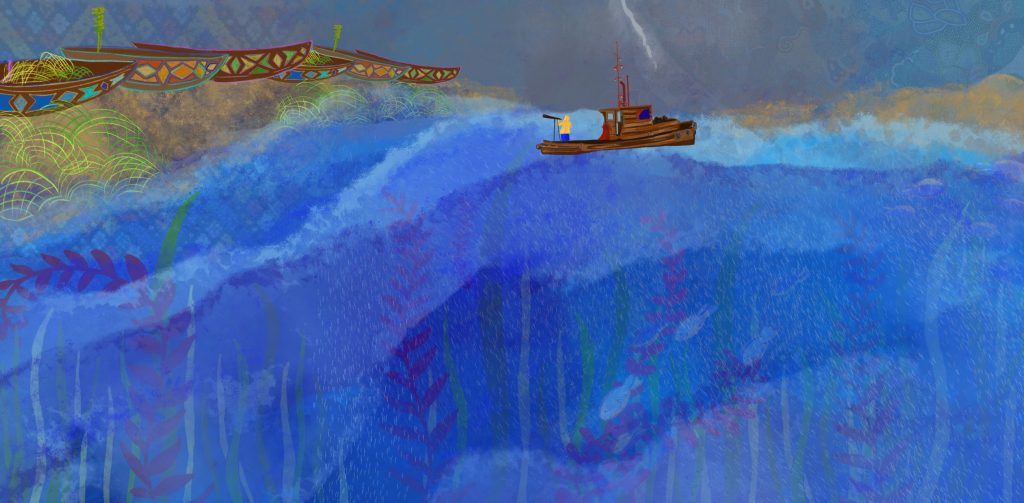Pathway Description
Illegal, Unreported, and Unregulated (IUU) fishing depletes fish stocks, disproportionately affects developing countries’ economic growth, and the livelihoods and food security of communities. For some countries, particularly small island developing states (SIDS), fishery resources are one of their most significant renewable resources, underpinning food supplies and economic development. IUU fishing is also linked to other criminal activities, including transnational organised crime (TOC), drug trafficking and financial crimes, and to human rights’ abuses, such as poor working conditions, children and human trafficking, and forced labour. These criminal activities have an adverse effects on the three billion people who rely on fish as a major source of animal protein as well as on small-scale fishers and women.
Understanding the concept of IUU fishing is the first step to finding solutions to this urgent issue. In the fight against IUU fishing, we also need to have a comprehensive understanding of the wide-ranging financial, environmental, and human rights’ impacts. By looking at the overlooked human rights implications of IUU fishing, we will be able to have a more complete picture of the consequences of IUU fishing for .livelihoods, food security, and social and cultural rights of small-scale fishers and their communities. This learning pathway also highlights integrated, holistic, and inclusive solutions, such as local plans and actions; national policy and legislation; and international measures. Efforts to deal with IUU fishing need to be developed in consultation with coastal communities.
Time required for the completion of the full pathway: 1.5 hours
NOTE that you need not complete the entire learning pathway in one session.
Learning outcomes
By the end of this course, you should have greater understanding of:
- The nature of IUU fishing
- The impacts of IUU fishing, including its impact on human rights
- How to address IUU fishing
This learning pathway has been written by Dr Senia Febrica, Knowledge Exchange Associate of the One Ocean Hub, University of Strathclyde, with contributions from Dr Alana Lancaster, University of the West Indies; Dr Bolanle Erinosho, University of Cape Coast; Prof Warwick Sauer, Rhodes University and Dr Andrea Longo, University of Strathclyde. Dr Febrica’s research focuses on maritime security cooperation and the particular challenges it poses in Southeast Asia. The learning pathway has been curated by Aphiwe Moshani.
Pathway Content
Module 1 Introduction: what is illegal, unreported and unregulated fishing?
Illegal, Unreported, and Unregulated (IUU) fishing is a broad term that encapsulates a diverse range of fishing activities. It can include fishing activities conducted by national or foreign vessels without permission, activities which have not been reported or have been misreported, and activities that contravene the conservation and management measures set by relevant authorities. This module explains the concept of illegal, unreported, and unregulated (IUU) fishing, what it entails, and how it is defined in international law. You will discover a wide variety of fishing activities that can be categorised as IUU fishing.
Module 2 Overview of the growing challenges and impacts of IUU fishing
Illegal, unreported, and unregulated (IUU) fishing depletes fish stocks, threatens livelihoods and food security of communities who rely on fisheries resources, and denies States, particularly small island developing states, their best opportunity for economic development. This module will provide an overview of the growing challenges posed by IUU fishing and its environmental, socio, economic, cultural, and human rights implications.
Module 3 What more can be done to address IUU fishing?
Addressing IUU fishing is difficult because of lack of resources, inefficient monitoring efforts, limited cooperation among different stakeholders, and the complex social, economic, and regulatory climate. This module explores different measures to tackle IUU fishing, such as more robust national policy and law, activities which grant further legal rights to small-scale artisanal fishers, and direct market intervention measures.
Module 4 Quiz and feedback
Take our quiz to test your knowledge - and provide feedback on the learning pathway (3 minutes)
Start Learning Pathway